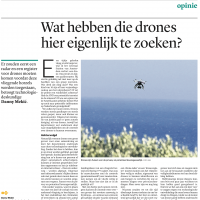A while ago, one passed me by as I was leaving the Central Station of the capital of the Netherlands: a drone. A quadrocopter, to be precise. Fortunately it managed to narrowly avoid crashing into a group of tourists. What was it doing there? Was it some 16 year old trying out their new birthday present? Was it the police, chasing a shoplifter? The General Intelligence and Security Service, who’d caught the scent of a potential terrorist? Or a spy from the American secret service NSA, looking for potential infiltrators on Dutch soil?
We’ll never know. They are getting cheaper, and are spotted more and more frequently, but they’re also becoming smaller and more advanced. Without knowing it, you can be filmed on the streets for $100, and you can be followed (effortlessly: thanks to facial recognition, a drone can automatically follow a person or object), your intimate conversations can be recorded, and your telephone and internet data traffic — both at home and while travelling — can be tapped. Equipped with infrared cameras, drones can also easily see through walls, and finally, they can be armed with weapons. Disastrous to personal privacy and potentially life-threateningly dangerous.
Even unarmed, because instead of shining a laser into the cockpit of an oncoming airplane, it’s not inconceivable that criminals or terrorists might remotely let a couple of drones take off right next to the runway of an airport while a Boeing 777 is just approaching it. In that situation, the Constabulary would need to be able to quickly (automatedly?) seize control in order to secure the flight. But what would that be like in practice?
If we’re unlucky, hackers would then take control — which is possible with drones, anyway — and create an extremely dangerous situation where no one can do a thing any more: neither the police, nor the terrorists. Minimally, there should be a ‘drone radar’ and a ‘drone register’ in order to keep air traffic safe, to be able to identify drone owners and also to tell citizens whom to complain to about privacy violations. But we aren’t nearly that far along yet.
Until then, why would we even allow drones in countries that aren’t at war? They pose a threat and they aren’t capable of anything that the resources that security agencies already have at their disposal can’t also do, and drone enthusiasts can stand to wait a few years until their hobby is properly regulated. Do we have the backbone to say ‘no’ for once to a technological development that threatens to force its way into our lives, until we’ve properly investigated and regulated the introduction of drones?

Leave a Reply